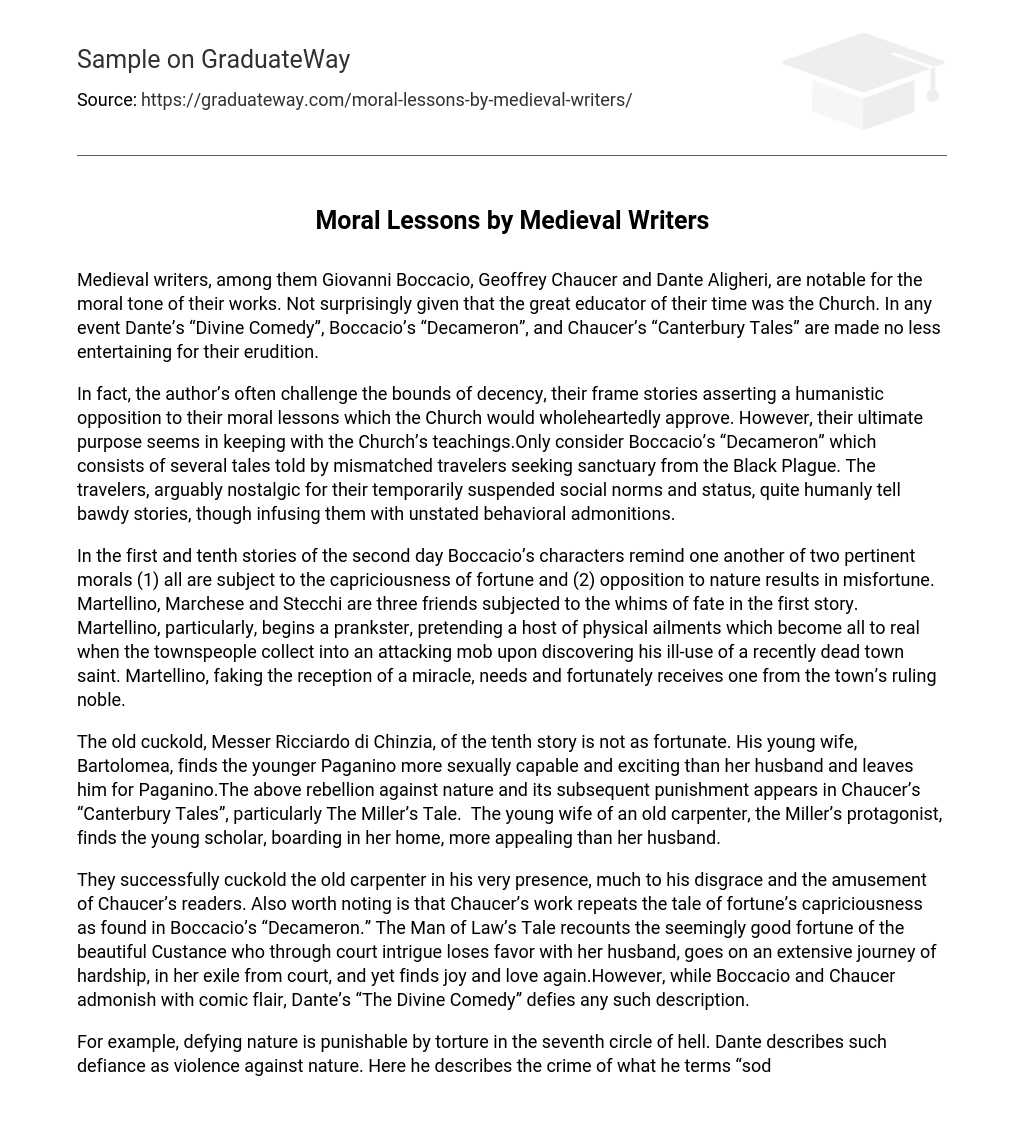Medieval writers, among them Giovanni Boccacio, Geoffrey Chaucer and Dante Aligheri, are notable for the moral tone of their works. Not surprisingly given that the great educator of their time was the Church. In any event Dante’s “Divine Comedy”, Boccacio’s “Decameron”, and Chaucer’s “Canterbury Tales” are made no less entertaining for their erudition.
In fact, the author’s often challenge the bounds of decency, their frame stories asserting a humanistic opposition to their moral lessons which the Church would wholeheartedly approve. However, their ultimate purpose seems in keeping with the Church’s teachings.Only consider Boccacio’s “Decameron” which consists of several tales told by mismatched travelers seeking sanctuary from the Black Plague. The travelers, arguably nostalgic for their temporarily suspended social norms and status, quite humanly tell bawdy stories, though infusing them with unstated behavioral admonitions.
In the first and tenth stories of the second day Boccacio’s characters remind one another of two pertinent morals (1) all are subject to the capriciousness of fortune and (2) opposition to nature results in misfortune. Martellino, Marchese and Stecchi are three friends subjected to the whims of fate in the first story. Martellino, particularly, begins a prankster, pretending a host of physical ailments which become all to real when the townspeople collect into an attacking mob upon discovering his ill-use of a recently dead town saint. Martellino, faking the reception of a miracle, needs and fortunately receives one from the town’s ruling noble.
The old cuckold, Messer Ricciardo di Chinzia, of the tenth story is not as fortunate. His young wife, Bartolomea, finds the younger Paganino more sexually capable and exciting than her husband and leaves him for Paganino.The above rebellion against nature and its subsequent punishment appears in Chaucer’s “Canterbury Tales”, particularly The Miller’s Tale. The young wife of an old carpenter, the Miller’s protagonist, finds the young scholar, boarding in her home, more appealing than her husband.
They successfully cuckold the old carpenter in his very presence, much to his disgrace and the amusement of Chaucer’s readers. Also worth noting is that Chaucer’s work repeats the tale of fortune’s capriciousness as found in Boccacio’s “Decameron.” The Man of Law’s Tale recounts the seemingly good fortune of the beautiful Custance who through court intrigue loses favor with her husband, goes on an extensive journey of hardship, in her exile from court, and yet finds joy and love again.However, while Boccacio and Chaucer admonish with comic flair, Dante’s “The Divine Comedy” defies any such description.
For example, defying nature is punishable by torture in the seventh circle of hell. Dante describes such defiance as violence against nature. Here he describes the crime of what he terms “sodomites” whose punishment it is to run in circles upon the fire that rains down upon the burning sand which make up this realm of hell. Still, the most important moral Dante imparts in his work is that human reason has its limitations.
Neither Dante nor his guide Virgil are able to descend past the sixth circle of hell without Christ’s intervention, their way barred by fallen angels, the furies, and the acknowledgment that human faculty cannot compete with pure evil.Dante represents the at least superficial intent of “The Divine Comedy”, “The Decameron” and “The Canterbury Tales”: to point out moral ineptitude in each writer’s society and the human soul’s accounting for such misdeeds. While Boccacio and Chaucer illustrate the increasingly humanistic perspective that came with the Renaissance, the latent moralizing of each clearly follows the tradition of what is arguably Dante’s sermonizing. Despite his ability to understand his world, his circumstances, to the point of transcendence, man must still seek an intercessor to achieve the neo-platonic state of perfect being.
And by choosing an ultimately admonishing tone, Boccacio and Chaucer seem in agreement with Dante that humanism only brings man so far before requiring divine intervention. That is to say the further man ventures from god toward’s humanism, a Lucifer-like hubris, the ninth level of hell, the greater the emphasis on his need for moral instruction and God’s saving grace. This finally is the point of Boccacio, Chaucer, and Dante, though they all make the lesson entertaining. Please note that I do not know precisely which books you used so fill in the pertinent information below.
ReferencesAligheri, Dante. (Publication Year). The Divine Comedy (Editor’s name, Ed. Or Translator’s name, Trans.
). City of Publication: Publishing Company.Boccacio, Giovanni. (Publication Year).
The Decameron (Editor’s name, Ed. Or Translator’s name, Trans.). City of Publication: Publishing Company.
Chaucer, Geoffrey. (Publication Year). The Canterbury Tales (Editor’s name, Ed. Or Translator’s name, Trans.
). City of Publication: Publishing Company.





